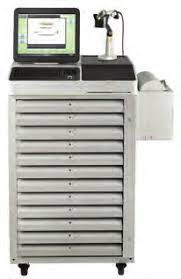
Pharmacy Technician II
Course Overview
Pharmacy Technician II
A Pharmacy Technician II is an advanced role for those who have completed the Pharmacy Technician I program, met state training requirements, and gained experience in the pharmaceutical industry. Typically, this includes completing a pharmacy technician training program, passing the Pharmacy Technician Certification Board (PTCB) exam, and having at least one year of experience working under a licensed pharmacist.
The Pharmacy Technician program at MTINY equips students with the skills to assist a licensed pharmacist at an intermediate level. Students will learn pharmacy computing, medication preparation, inventory management, customer service, and sterile compounding. The curriculum includes lectures, labs, and an internship with supervised clinical experience. Graduates will be prepared to seek employment as Pharmacy Technician II.
Pharmacy Technician II: Key Responsibilities and Qualifications
A Pharmacy Technician II is a medical professional who has met state pharmacy training requirements, including completing a pharmacy technician program, passing the Pharmacy Technician Certification Board (PTCB) exam, and gaining at least one year of experience under a certified pharmacist.
Primary responsibilities of a Pharmacy Technician II include:
- Sterile IV and chemotherapy compounding
- Using pharmacy equipment and software
- Labeling and packaging prescriptions
- Assisting with prescription preparation
- Entering data for reports and patient records
- Engaging with customers and patients
- Storing and organizing medications
- Filing insurance paperwork
Program Summary
Course overview
We are still updating our website with contents. Please check back next time.
Program Schedule
SPRING SCHEDULE*
Start Date: 3/12/2025
Expected Graduation Date: 10/15/2025
SUMMER SCHEDULE*
Start Date: 6/4/2025
Expected Graduation Date: 1/26/2026
*Orientation will be held approximately one week prior to the start of the program.
MTI Mission & Goals
The mission of MTI of New York is to offer education in Allied Health for on-demand occupations to members of our community in pursuit of advancing their career path in this employment sector. As such, MTI strives to deliver to its community of learners, opportunities for career advancement, change and expanding industry standards, the optimum delivery of services, which meet and exceed industry expectations, to place graduates at the top of the candidacy pool for positions within their area of choice.
Program Curriculum
| Course Code | Course Title | Hours |
|---|---|---|
| CPT101 | Personal/Interpersonal Knowledge and Skills | 56 |
| CPT102 | Foundational Professional Knowledge and Skills | 34 |
| CPT103 | Processing and Handling of Medications and Medication Orders | 80 |
| CPT104 | Sterile and Non-Sterile Compounding | 200 |
| CPT105 | Patient Care, Quality and Safety Knowledge and Skills | 20 |
| CPT106 | Regulatory and Compliance Knowledge and Skills | 10 |
| CPT107 | Pharmacy Internship I: Community Practice Settings | 130 |
| CPT108 | Pharmacy Internship II: Institutional Care | 200 |
| CPT109 | Career Development | 5 |
| CPT110 | PTCB/ASHP Exam Preparation | 15 |
| TOTAL PROGRAM HOURS | 750 | |
Grading Scale and Methods of Evaluation
| LETTER CODE | INCLUDED IN HOURS EARNED | INCLUDED IN HOURS ATTEMPTED | INCLUDED IN CGPA AND SAP | QUALITY POINTS |
|---|---|---|---|---|
| A = 90 - 100% | Yes | Yes | Yes | 4.00 |
| B = 80 - 89% | Yes | Yes | Yes | 3.00 |
| C = 70 - 79% | Yes | Yes | Yes | 2.00 |
| F = 0 - 69% | No | Yes | Yes | 1.00 |
| AU (audit) | No | No | No | n/a |
| I (incomplete) | No | Yes | No | n/a |
| P (pass) | Yes | Yes | No | n/a |
| PR (proficiency) | Yes | Yes | No | n/a |
| TC (transfer credit) | Yes | Yes | No | n/a |
| W (withdraw) | No | Yes | No | n/a |
| WP (LOA) | No | No | No | n/a |
| NP (not pass) | No | Yes | Yes | n/a |
Admission
GENERAL ADMISSIONS REQUIREMENTS
Prospective students are encouraged to apply for admission as early as possible to secure a place in their desired program and starting date. All applicants are required to complete a personal interview with an admissions representative, which is conducted in person. Guardians or significant others are encouraged to participate in the interview process. This interview helps the institution assess the applicant’s suitability for enrollment.
To complete the enrollment process, applicants must submit the following:
- Application for Admission Form
- Enrollment Agreement
- If under 18 years of age, the Enrollment Agreement must also be signed by a parent or guardian.
- Application Fee Payment
- This fee is non-refundable unless the applicant is denied admission or cancels the application within three days of the institution’s receipt of the application and fee.
- Student and Programmatic Disclosure Forms
- Entrance Exam (if applicable)
- Refer to “Selective Admissions Criteria” for details.
- Request for Official Transcripts
- Required if seeking transfer of previously earned college credit.
- Interview Acknowledgment Form/Student Information Record
The institution reserves the right to deny or rescind an applicant’s eligibility to begin classes if all general and selective admissions requirements are not successfully completed within the required timeframe.
Program-Specific Admission
Admission to one program does not guarantee eligibility for other programs. Applicants wishing to enroll in a different program in the future must independently meet all the requirements for that program at the time of application and undergo the selection process for that program.
Proof of Graduation
Documentation of high school graduation or its equivalent must be provided before the student’s first scheduled class. The student’s responsible for providing valid proof, and additional documentation may be required to verify authenticity. Failure to provide this documentation will result in enrollment cancellation, forfeiture of academic credits earned prior to cancellation
Prospective students must comply with the following admission requirements to enroll:
- Present a Valid picture ID
- Present one of the following:
- High School Diploma
- GED
- an associate or bachelor’s degree official transcript as proof of higher education completion.
- Students enrolling in a program including a clinical component are required to pass the Level 2 Criminal Background Check completed through an MTI of New York third-party.
- To qualify for enrollment, a one-on-one appointment with one of the school admissions’ representatives is needed. During the one-on-one appointment, the admission’s representative will provide advisement services to aid the student in planning and completing the program for enrollment.
- Diplomas and transcripts for education completed in a foreign country must be accompanied by the corresponding official translation and evaluation. For a listing of accepted translators and evaluators visit the National Association of Credential Evaluation Services (NACES) at www.naces.org Our school only accepts translations and evaluations received directly from NACES members, sent directly to our school, and addressed to MTI of New York, attention Admissions Department, 211 East 43rd Street, 2nd Floor, New York, NY 10117.
Selective Admissions Criteria
Some programs require additional testing or institution credit requirements. When the number of applicants exceeds available seats, a rubric is used to objectively assess and rank applicants. Factors considered include:
- Postsecondary coursework and grades (Math and Science focus)
- Entrance exam scores
- Prior graduation from an Allied Health program at another CEC institution
Applicants are ranked, and notifications of acceptance or alternate status will be issued. Alternates will be notified no later than the drop/add period of the class start date. Entrance exams may be waived for applicants holding an associate's degree or higher from an accredited institution.
Entrance Exam Re-Test Policy
Applicants who do not achieve the required score on an entrance exam may retest as follows:
- Second attempt: After a 24-hour waiting period.
- Third attempt: after a 48-hour waiting period.
- Fourth attempt: after a one-year waiting period.
Additional Program-Specific Requirements
- Diagnostic Medical Sonography (DMS) Program: Applicants are assessed using a standardized rubric that includes grades in Math and Science, Accuplacer Math scores, Wonderlic scores, and Program Director recommendations. Ranking determines final cohort acceptance.
Program Entrance Requirements
Students enrolling in the following programs must pass the Wonderlic Scholastic Level Exam (SLE) Entrance Test:
- Students enrolling in a hybrid program.
- Students enroll in an onsite (on campus) program for 300 hours or more.
The Wonderlic Scholastic Level Exam (SLE) minimum passing score is 13. The cost is $ 35 and paid by the student. Students can retake after a week, for a maximum of three (3) times.
| PROGRAM | WONDERLIC SCORE | ACCUPLACER SCORE (OVERALL/MATH) | ADDITIONAL REQUIREMENTS |
|---|---|---|---|
| Cardiovascular Sonography | 18 | 125/60 | Have a criminal background check |
| Diagnostic Medical Sonography | 18 | 130/65 | Have a criminal background check |
| Medical Assistant | 13 | N/A | None |
| Medical Billing | 13 | N/A | None |
| Pharmacy Technology | 13 | N/A | Have a criminal background check |
ASSOCIATE OR ADVANCED DEGREE ADMISSIONS REQUIREMENT
In addition to the general admission requirements, students wishing to enroll in the following programs are required to present an official transcript demonstrating the student has graduated from an Associate, Bachelor, or advanced Degree program from an accredited higher education institution recognized by the United States Federal Department of Education, or its equivalent as approved by an official evaluation and translation by a member of the National Association of Credential Evaluation Services (NACES) at www.naces.org:
- Surgical Technology Programs
- Radiography Technology Programs
- Radiation Therapy Programs
Official transcripts are to be sent directly from the issuing institution to MTI of New York, attention Admissions Department, 211 East 43rd Street, 2nd Floor, New York, NY 10117
You can still apply
Graduation Requirements
To qualify for graduation, students must maintain a minimum 2.0 (C) Grade Point Average and be current with their tuition payments. Students must also satisfy the requirements of any externship or internship in which they have participated.
- A minimum, cumulative GPA of 2.0.
- Complete all documents, files, and examinations, as necessary.
- Comply with all Medical Training Institute of New York regulations.
- Fulfill all financial obligations to MTI of New York.
- Successfully complete an externship as required.
- Return swipe card and ID card
Tuition, Books & Technology Fees
Total Program Cost:
| Program | Pharmacy Technician II |
| Hours | 750 |
| Application Fee: | $100 |
| Tuition: | $3,600 |
| Technology Fee: | $400 |
| Clinical & Lab Fee: | $700 |
| Book Fee: | $270 |
| Uniform Fee: | $106 |
| Total Program Cost: | $5,176 |
Fees
Registration Fee:
A non-refundable Registration Fee of $100 was due during registration to reserve a seat.

Clinical/Lab Fee:
Clinical/Lab Fee is used to cover the cost of Liability insurance policy and student lab operations and to provide students with Liability Insurance at clinical rotation internship sites.

Technology Fees:
Technology Fee provides students with Online Learning Resources, the learning management system, and the student portal.

Books:
Students are required to purchase all textbooks on their own. Textbook costs are estimated at $800.00. Required books can be purchased from the school bookstore or online at portal.mtiofnewyork.com/stores.

Uniform Fee:
Students are required to purchase MTI logo Lab coat and scrubs on their own. MTI logo scrubs can be purchased from the school bookstore or online at portal.mtiofnewyork.com/stores.

Tuition:
Certified Pharmacy Technician II is $1,467 for each of the program's three (3) quarters and a total of $4,800 for the entire program, with tuition payments due as follows:

| Refundable | Non-Refundable | ||||||
|---|---|---|---|---|---|---|---|
| Prior to Quarter 1 & 2 | Total | Tuition | Technology | Clinical & Lab | Registration | Books | Uniform |
| $3,609 | $2,400 | $267 | $467 | $100 | $270 | $106 | |
| Prior to Quarter 3 | $1,567 | $1,200 | $133 | $233 | |||
| Total Cost | $5,176 | $3,600 | $400 | $700 | $100 | $270 | $106 |
Confirmation of Fee Terms:
- Tuition refunds will be processed in accordance with the program’s refund calculation policy as governed by New York State.
- Technology and Clinical/Lab fees are refundable only if a refund request is made before the start of a quarter.
- Book and Uniform fees must be paid prior to Quarter 1 and are non-refundable.
Paying For Your Program
PAYMENTS
Method Of PaymentThe Student Accounts Office offers a veriety of payment options, including online payments, credit cards, checks, wire transfer, Western Union, Paypal, and cash; both Monthly/Bi-Weekly/Weekly Paymeny plans and as a lump sum. Students who desite greater flexibility
In all cases, Program Tuition and Fees must be paid in full (in US Dollars) before your course’s enrollment deadline based on the table in the Tuition section above.
- Payment Options
- Payment Plans may be available to students
The Payment Plan allows you to pay quarter Tuition and fees over four installments per quarter. A suggested initial down payment of $1,650 of the total tuition cost is required for all quarter programs, after which the remainder of the tuition is divided into five installments per quarter.
To enroll in the Payment Plan, please email StudentBilling@mtiofnewyork.com. Be sure that “Payment Plan” appears in your message’s subject line. Visit our website www.mtiofnewyork.com for a more detailed explanation.
Private Education LoansStudents may elect to apply for a loan and choose to pursue loans to cover the cost of their education or any part of it, over a Term or a Quarter. You can take out loans to cover the entire cost of the Program, or just a part of the cost, as a supplement to your Monthly/Bi-weekly/weekly income. For more information, visit our website
https://www.mtiofnewyork.com/medical-training-institute-student-financial-services/Students must provide a signed promissory note from the issuing body. This agreement will become effective when the signed promissory note is provided to the school
Refund Policy
A student who cancels within 7 days of signing the enrollment agreement receives all monies returned, with the exception of the non-refundable registration fee.
Thereafter, a student will be liable for
- The non-refundable registration fee plus
- The cost of any textbook or supplies accepted, plus
- Tuition liability as of the student’s last date of physical attendance.
Tuition liability is divided by the number of quarterly in the program. Total tuition liability is limited to the quarter during which the student withdrew or was terminated, and any previous quarter completed.
Termination
During the first quarter of the program:
If termination occurs Student Refund School may keep Student Refund Prior to or during the first week 0% 100% During the second week 25% 75% During the third week 50% 50% During the fourth week 75% 25% After the fourth week 100% 0% During the second and remaining quarters of the program:
If termination occurs Student Refund School may keep Student Refund Prior to or during the first week 25% 75% During the second week 50% 50% During the third week 75% 25% During the fourth week 100% 0% -
The student refund may be more than that stated above if the accrediting agency refund policy results in a greater refund.
Refunds are calculated based on the student’s last day of physical attendance and the total quarter’s tuition due, not the total tuition paid by the student up to that point. If a student withdraws during the second term/quarter, the student must use the “First Term/Quarter” schedule unless the school can demonstrate that no significant educational change has occurred in the program as of the student’s last date of attendance. Significant educational change is defined as non-functioning educational equipment which adversely affects a student’s educational program, a material change in the student’s schedule as agreed to at the time of the student’s enrollment, substitution of a teacher in a course after instruction has begun where such teacher does not possess the necessary language skills in the approved language of instruction in order to effectively communicate the subject matter to the students, or a significant increase in the student to teacher ratio. If no significant educational change has occurred at the beginning of the second term/quarter, the refund policy for subsequent terms/quarters applies. The student refund may be more than that stated above if the accrediting agency refund policy results in a greater refund.
Instructor
We are still updating our website with contents. Please check back next time.
PHARMACY TECHNOLOGY: OMNICELL AND PYXIS TRAINING
This course covers the use of automated dispensing cabinets, such as Omnicell and Pyxis, which are used in healthcare settings for managing medications and supplies. These systems operate like vending machines, with software handling patient orders, medication documentation, inventory, and billing.
In clinical settings, these units are placed in areas like General Medicine, ICU, OR, and ER, allowing clinicians to access locked medications and supplies.
The course also prepares students for pharmacy automation jobs, such as Implementation Consultants or Field Engineers, particularly for those with technology skills and a pharmacy technician background.
Additionally, students will learn skills for retail settings (CVS, Walgreens), including prescription interpretation, inventory control, third-party reimbursement, and non-sterile compounding.
In a hospital or other clinical setting, the units are installed at most units where patients are seen, such as General Medicine, ICU, the OR, and the ER. Supplies and/or meds are enclosed in the cabinets that are locked until the clinician accesses them.
If you are looking to get started in Healthcare IT, have basic technology skills, and are willing to travel, you have a decent chance of getting a job as an Implementation Consultant or Field Engineer. Having some Microsoft or Network+ certification helps, as well as having a Pharmacy Technician background. If you have programming and/or HL7 experience, then you would have a good chance at a developer position.
This course is designed to provide skills necessary to effectively practice in retail stores (CVS/Walgreen Pharmacy) and ambulatory care settings. Students learn to interpret prescription contents, familiarize the top 100 drugs, inventory control procedures, tasks associated with procurement of pharmaceuticals, completing and filing records for third-party reimbursement, and requirements for completing and filing prescription records. Students are also introduced to non-sterile compounding.

WHAT YOU'LL LEARN
- Orientation to Pharmacy Practice
- Personal/Interpersonal Knowledge and Skills
- Foundational Professional Knowledge and Skills
- Processing and Handling of Medications and Medication Orders
- Sterile and Non-Sterile Compounding
- Community Practice, Pharmacy, Record and Inventory Management
- Patient Care, Quality and Safety Knowledge and Skills
- Regulatory and Compliance Knowledge and Skills
- Pharmacy Internship I: Community Practice Settings
- Pharmacy Internship II: Institutional Care Settings
- Career Development
- PTCB/ASHP Exam Preparations
WHO WILL BENEFIT

Those Considering Pharmacy School
If your goal is to become a Pharmacist, starting out as a Pharmacy Technician is a great opportunity to explore the Pharmacy field. You'll get the chance to work alongside Registered Pharmacist and PharmDs’ (Doctor of Pharmacist) in a variety of healthcare settings, earning invaluable experience and skills along the way.

Aspiring Medical Professionals
Working as a Pharmacy Technician gives many of us our first taste of working in the medical field. You might gain inspiration to continue that career path and get a more in-depth understanding of the medical world. It's okay to share this desire with your interviewer. It shows your dedication to the field and a willingness to learn

Job Stability
Pharmacy technician jobs in the U.S. number around 422,000, with an expected growth rate of 4% over the next decade, in line with the national average. While data on job outlook for specific certification levels is limited, employers often prefer Pharmacy Technician II candidates due to their advanced skills and training.
The aging population and the rise in chronic diseases like diabetes are driving increased demand for prescription medications. As pharmacists take on more patient care duties (e.g., administering flu shots), Pharmacy Technician IIs will play a larger role in tasks such as preparing medications, verifying work, and collecting patient information.
The average salary for a pharmacy technician is around $30,247 per year, though those with advanced certifications or specialized skills, such as CPR or first aid, may earn more. Technicians in settings like long-term care facilities could also see higher wages based on additional qualifications.
THE MTI ADVANTAGE
- State-of-the-Art Cleanrooms- UPS 797 and UPS 800
- Experience Faculty and Staff
- 100% Medical and Healthcare Programs
- State-of-the-Art Medical Equipment’s
- All instructors are Practitioners in their field
- Workshops to enter the Workforce
- Guaranteed Internships/Externships (Hands-on Training)
- Affiliated with top Hospitals and clinics, Pharmacy Stores
- Career Development Skill
- Job placement Assistant
Spring 2025
March 12, 2025
Total hours: 750
Day, Evening, Weekend Options
Weekdays: 38 Weeks Weekends: 47 Weeks
Weekdays: 20 hours Weekends: 16 hours
Tuition Cost: $3,600
Total Program Cost: $5,176
Apply NowSummer 2025
June 4, 2025
Total hours: 750
Day, Evening, Weekend Options
Weekdays: 38 Weeks Weekends: 47 Weeks
Weekdays: 20 hours Weekends: 16 hours
Tuition Cost: $3,600
Total Program Cost: $5,176
Apply Now





